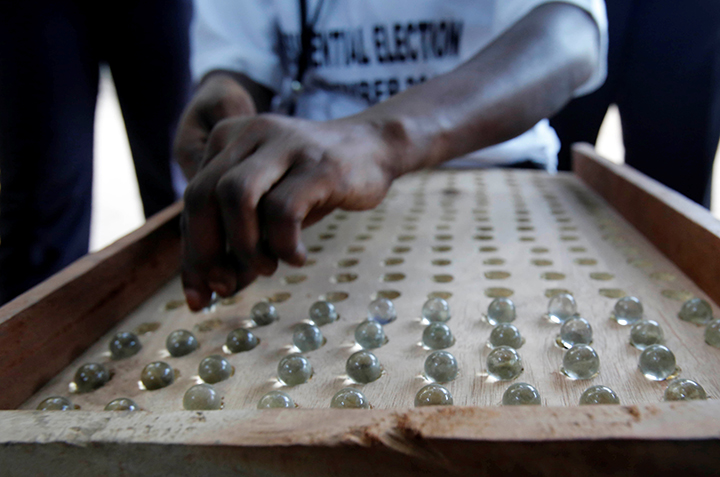
The results from The Gambia’s presidential election, which pitted opposition United Democratic Party (UDP) candidate Adama Barrow against longtime president, Yahya Jammeh, made history as they trickled in late at night on December 1. The small West African country, bound on three sides by Senegal, has been ruled for more than two decades by the eccentric and repressive Jammeh.
Early on December 2, The Gambia’s electoral commissioner called the election for Barrow, citing his 45 percent of the vote compared to Jammeh’s 36 percent. The victory is a massive upset in an election whose result was widely considered a foregone conclusion; Jammeh has already claimed victory in what Freedom House declared to be four “violent and rigged” elections since seizing power in a coup against the government of Dawda Jawara in 1994. The outcome of the 2016 election represents a victory for democracy in Africa—but also requires a supportive US and international response to protect this nascent gain.
In the immediate aftermath of the election one vital issue remains unsolved: Jammeh himself has not officially conceded.
Incredulity about the result continues a year-long trend of political surprises: British voters’ decision to leave the European Union, or “Brexit,” in June; Colombians rejecting the country’s peace deal with the Revolutionary Armed Forces of Colombia, better known as the FARC, in a plebiscite in October [Editor’s note: A revised peace deal was approved by Colombia’s Congress on November 30.]; and the rise of Donald Trump and his triumph in the US elections in November.
The impact of Barrow’s win is made all the more important by the state of democracy and human rights in The Gambia: the country is ranked “not free” by the non-profit organization Freedom House, which details the lack of press freedom, freedom of association, and frequent use of torture against imprisoned political opponents. A coup attempt in December 2014 failed, and two of the participants—both US citizens—were subsequently charged by the United States for helping the plot to overthrow of a foreign leader.
Exit Jammeh?
Jammeh, who took power in a coup in 1994, is an eccentric figure. Listed as “His Excellency Sheikh Professor Alhaji Dr. Yahya A.J.J. Jammeh Babili Mansa” on the Gambian government’s website, he once claimed to have a herbal cure for HIV/AIDS. Also on the site (which is currently inaccessible) is a detailed list of his accomplishments, including a non-existent award from the Navy of the landlocked state of Nebraska. As recently as 2009, Jammeh conducted extensive witch-hunts, which included forcing alleged sorcerers to consume a potion to determine their guilt (if they died) or their innocence (if they survived). He is virulently anti-LGBT. In 2012, Jammeh sentenced nine prisoners to death by firing squad, prompting international condemnation.
More recently, The Gambia signaled its intention to leave the International Criminal Court (ICC), joining the likes of Burundi and South Africa in a series of African states voicing their displeasure with the body. The Gambia’s information minister nicknamed the institution the “International Caucasian Court” and derided what he viewed as a bias toward prosecuting Africans. Barrow campaigned on his intention to rejoin the ICC.
In 2011, Jammeh defiantly declared his intention to stay in power to the BBC: “If I have to rule this country for one billion years, I will, if Allah says so.” But his government’s repression appears to have pushed many Gambians to a breaking point—massive protests calling for Jammeh to step down broke out earlier this year, and many were violently put down by Jammeh’s security forces. The opposition appears to have successfully channeled that discontent into change at the ballot box.
The Gambian opposition, for its part, coalesced around Barrow. A total of seven parties backed Barrow’s candidacy; a third-party candidate—Mama Kandeh—also ran. On election day, the Gambian regime did its best to add a fifth term to Jammeh’s list of accomplishments: it restricted the Internet, banned international phone calls, and outlawed demonstrations. But people turned out anyway.
What happens next is key. Jammeh has not yet conceded the race, and although news reports indicate that an announcement is imminent, it is still possible that he will contest or deny the results, potentially sparking violent confrontations. If he concedes, the international community will need to act quickly and decisively to support a peaceful transition of power, including by making resources and expertise available to Barrow and the opposition as they draw up plans for the transition and the crucial task of governing The Gambia.
Kelsey Lilley is associate director of the Atlantic Council’s Africa Center. Follow her on Twitter @KelseyDegen.
Image: A poll worker counts votes cast by marbles after the close of voting during the presidential election in Banjul, Gambia, on December 1. Yahya Jammeh, the Gambia’s authoritarian president of twenty-two years, suffered a surprise defeat. (Reuters/Thierry Gouegnon)

